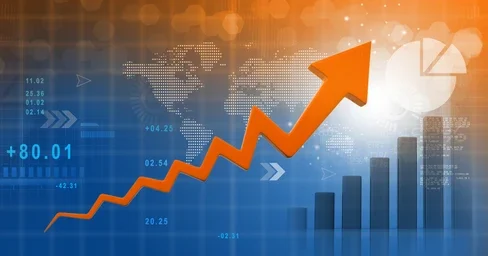Dubai’s Economy Renaissance
Dubai Economy has emerged as a leading global business hub, attracting international companies and investors from across the globe. With its strategic location, world-class infrastructure, and business-friendly policies, the city has become a magnet for businesses, especially in sectors like tourism, finance, and real estate. Over the past few decades, Dubai has transformed from a small trading post into a global powerhouse, driving Economy growth not only within the UAE but also across the broader Middle East and beyond.
Strategic Location: A Gateway to the World
Dubai’s geographical location plays a pivotal role in its rise as a business hub. Situated at the crossroads of Europe, Asia, and Africa, it serves as a bridge for global trade. The city’s proximity to major emerging markets in the Middle East, North Africa, and Asia gives it a distinct advantage for businesses looking to expand their reach. Dubai’s state-of-the-art ports, such as Jebel Ali Port, one of the largest in the world, along with the world’s busiest airport for international passengers, Dubai International Airport, create an efficient logistics network, making the city a prime choice for international companies.

Business-Friendly Environment: The Backbone of Dubai’s Success
Dubai has built a reputation for being one of the most business-friendly cities in the world. The UAE government’s commitment to creating a conducive environment for foreign investment has been pivotal in Dubai’s economic rise. One of the key attractions is the tax-free environment, where businesses enjoy exemptions from personal income tax and corporate tax in most sectors. Furthermore, Dubai’s commitment to ease of doing business has earned it high rankings in global indices, including the World Bank’s “Doing Business” report.

Another significant factor that contributes to Dubai’s business appeal is its regulatory framework. The Dubai International Financial Centre (DIFC) and Dubai Silicon Oasis (DSO) offer free zone setups with clear regulations and infrastructure that support innovation and investment. These free zones allow businesses to operate with complete autonomy, facilitating smooth entry into the market for foreign investors and global Economy corporations.
Tourism Sector: Dubai’s Billion-Dollar Industry
Tourism is one of the cornerstones of Dubai’s economy. The city has developed a robust tourism infrastructure that attracts millions of visitors annually, both for business and leisure. Major global events like the Dubai Expo 2020 (held in 2021) and Formula 1 Grand Prix continue to highlight the city as an international event hub. Luxury shopping, world-renowned hotels, iconic landmarks like the Burj Khalifa, and man-made marvels like Palm Jumeirah draw tourists from all over the world.
Tourism also plays a crucial role in boosting other sectors, such as retail, hospitality, and real estate. Dubai’s real estate market has benefited immensely from the influx of tourists, many of whom are drawn to invest in the city’s thriving property sector. The Dubai Tourism Department has worked hard to position the city as a year-round destination with a focus on attracting high-spending tourists.
Financial Sector: Dubai’s Banking and Investment Powerhouse
Dubai’s Economy financial sector is another major contributor to its status as a global business hub. The Dubai International Financial Centre (DIFC) is the leading financial hub for the Middle East, North Africa, and South Asia (MENASA) region. It hosts over 2,400 active companies, including global banks, investment firms, and insurance companies. With regulations based on international standards, DIFC has created a highly competitive financial ecosystem that attracts multinational corporations and financial institutions seeking a gateway to the Middle East markets.
Moreover, Dubai has become a major player in the global fintech sector, thanks to its forward-thinking policies and investment in digital infrastructure. The government has launched various initiatives to promote fintech innovation, including the Dubai International Financial Centre’s (DIFC) innovation hub and the Dubai Future Foundation’s support for startups. These efforts position Dubai as a leading global player in the fintech space.
Real Estate Sector: Investment Powerhouse
Real estate is perhaps the most prominent sector fueling Dubai’s Economy growth. The city’s real estate market has witnessed extraordinary growth over the years, with properties like the Burj Khalifa and the Palm Jumeirah drawing significant global interest. Dubai’s luxury real estate sector, particularly in residential and commercial properties, attracts international investors seeking high returns.
Dubai’s real estate laws are structured to provide security for foreign investors. The government has introduced various measures to encourage property ownership, including the ability for foreign investors to buy property in designated areas. This, coupled with the city’s world-class infrastructure, makes Dubai a haven for property developers, investors, and buyers alike. With ongoing mega-projects like Dubai Creek Tower and the Dubai South district, the city’s real estate sector remains a significant driver of both the local and regional economy.
Innovation and Technology: Dubai’s Vision for the Future
Dubai’s rapid economic transformation has been closely tied to its focus on innovation and technology. The city has made substantial investments in sectors like artificial intelligence, blockchain, and smart city technologies. Dubai has launched initiatives such as the Dubai Smart City project, aiming to make the city one of the most connected and sustainable places on Earth.
Dubai’s commitment to becoming a leader in technology innovation has resulted in a thriving startup ecosystem. The Dubai Internet City, Dubai Silicon Oasis, and Dubai Media City have all become magnets for tech startups, attracting talent from all over the world. The government continues to introduce incentives and funding opportunities to foster innovation, positioning Dubai as a leader in the knowledge economy.
The Vision 2030: Sustaining Growth and Diversification
Looking ahead, Dubai’s Vision 2030 focuses on diversifying its economy, reducing dependence on oil revenues, and embracing new technologies and industries. The UAE government has made significant strides in expanding into sectors such as renewable energy, healthcare, and education, and Dubai is expected to play a central role in these developments. By focusing on building a knowledge-based economy, Dubai seeks to establish itself as a global leader in innovation, sustainability, and business.
Dubai’s real estate market will remain a major driver of economic growth, while tourism and finance will continue to play key roles. However, the future of Dubai lies in its ability to adapt to changing global dynamics, particularly in the fields of technology and green energy. As the city continues to evolve, it is clear that Dubai will remain at the forefront of global economic development.
Conclusion: Dubai’s Place on the Global Stage
Dubai’s status as a global business hub is no accident. Through a combination of strategic location, favorable business policies, and a relentless focus on innovation, the city has positioned itself as one of the world’s leading economic powerhouses. The sectors driving Dubai’s economy, including tourism, finance, and real estate, are expected to continue flourishing in the years to come. With its Vision 2030 initiative, Dubai is poised to remain a global magnet for businesses, investors, and entrepreneurs alike, solidifying its place as one of the most dynamic economies in the world.
Sources:
You can also read about, UAE’s Futuristic Masterpieces.















